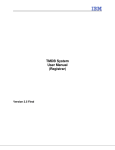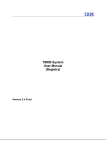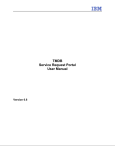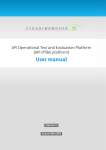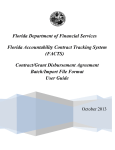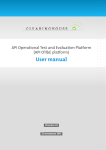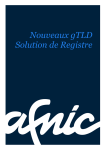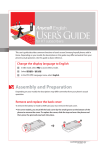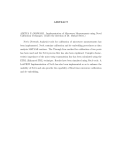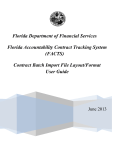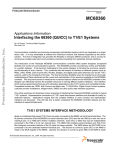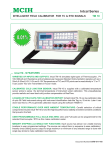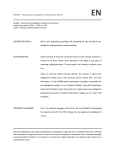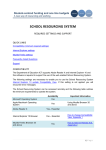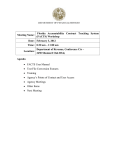Download TMDB System User Manual
Transcript
TMDB System User Manual (Registry) Version 2.3 Final ICANN Sunrise and Claims TMDB System User manual Version: 2.3 (Final) Date: 30 augustus 2013 Table of contents 1. INTRODUCTION ..................................................................................................................................4 1.1. 1.2. 1.3. 1.4. OVERVIEW OF THE TMDB SYSTEM ............................................................................................................. 4 THE INTENDED AUDIENCE FOR THIS DOCUMENT ......................................................................................... 4 OVERVIEW OF THIS USER MANUAL............................................................................................................... 4 REFERENCED DOCUMENTS .......................................................................................................................... 4 2. THE SUNRISE AND CLAIM PROCESSES .........................................................................................5 3. USING THE TMDB SYSTEM IN THE REGISTRY ROLE ...................................................................6 3.1. 3.2. 3.3. 3.4. 4. TMDB FIRST TIME REGISTRATION AND LOGON ........................................................................................... 6 USER PROFILE MANAGEMENT ...................................................................................................................... 9 TMDB SYSTEM CONNECTIONS CONFIGURATION....................................................................................... 10 DOWNLOADING FILES OR UTILIZING SERVICES .......................................................................................... 12 APPENDIX.......................................................................................................................................... 15 4.1. 4.2. 4.3. FREQUENTLY ASKED QUESTIONS .............................................................................................................. 15 LORDN ERROR CODES ............................................................................................................................. 16 GLOSSARY ................................................................................................................................................. 17 Public document IBM, 2013 Page 2 ICANN Sunrise and Claims TMDB System User manual Version: 2.3 (Final) Date: 30 augustus 2013 Table of figures Figure 1: Example of an account sent by email .............................................................................................................. 6 Figure 2: Example of an account sent by email .............................................................................................................. 6 Figure 3: Registration screen for a Registry ................................................................................................................... 7 Figure 4: Registry login screen ....................................................................................................................................... 8 Figure 5: Set a new password screen ............................................................................................................................ 8 Figure 6: Profile screen for a Registry ............................................................................................................................ 9 Figure 7: Screen to specify Person of Contact (POC) information................................................................................ 10 Figure 8: Screen to configure the SMD revocation list service ..................................................................................... 10 Figure 9: Screen to configure the LORDN service........................................................................................................ 11 Figure 10: Screen to configure the DNL list service...................................................................................................... 11 Figure 11: Switching from production to test (and vice versa) ...................................................................................... 12 Public document IBM, 2013 Page 3 ICANN Sunrise and Claims TMDB System User manual Version: 2.3 (Final) Date: 30 augustus 2013 1. Introduction This User Manual contains all essential information for the Registry Operator to make full use of the TMDB system. This manual includes a description of the platform, its functions, capabilities and step-by-step procedures for configuring and utilizing your connections to the system. 1.1. Overview of the TMDB system Starting in 2013, new generic Top Level Domains (TLDs) will be introduced. Two processes are designed to protect trademark rights in this new domain space. These processes are called the ´Sunrise´ and ´Claims´ processes. ICANN has designated the setup of a single central Trademark Database (TMDB) to support the Sunrise and Claims processes that have to be implemented by Registry and Registrar Operators. In addition to supporting sunrise and claims processes, the TMDB system includes a test function allowing Registry Operators to test those processes. In summary, the TMDB system allows Registry Operators to: • Self-register with the TMDB. To be able to self-register with the TMDB the Registry or Registrar Operator needs to possess an ICANN issued Registration Token as described in Section 3.1 • Manage their profile, i.e. manage contact details and connection details (IP addresses and passwords) as described in Section 3.3.2 • Retrieve the SMD Revocation List as described in Sections 3.3.1 and 3.4.1 • Retrieve the DNL List as described in Sections 3.3.3 and 3.4.2 • Submit a LORDN File as described in Sections 3.3.2 and 3.4.3 1.2. The intended audience for this document This User Manual is intended for Registry Operators or Registries under contract with ICANN (entities that accept Domain Name registrations from Registrars, maintaining the central Database of Registered Domains). A Registry Operator is a contracted party with ICANN for the TLD. Only Registries that are authorized by ICANN are able to use the TMDB system. It is assumed that the readers of this document are already familiar with domain registration processes and ICANN’s New gTLD program. 1.3. Overview of this user manual This manual contains the following chapters: • Chapter 1: Introduction to the TMDB system and its users. • Chapter 2: General overview of the Sunrise and Claim processes. • Chapter 3: Explanation how Registries can use the TMDB system • Chapter 4: Appendix Please note that the project is still under development and thus subject to change and feedback. The screens shown in this document may vary from the actual final screens. 1.4. Referenced documents The following documents are referenced in this user manual: Ref nr Document 1 TMCH Functional Specifications http://tools.ietf.org/html/draft-lozano-tmch-func-spec Public document Version Date Author 6 G. Lozano IBM, 2013 13-05-2013 Page 4 ICANN Sunrise and Claims TMDB System User manual Version: 2.3 (Final) Date: 30 augustus 2013 2. The Sunrise and Claim processes This chapter provides a general overview of the Sunrise and Claims processes for which the TMDB system is used. As part of ICANN’s New gTLD program, the number of new generic Top Level Domains (TLDs) will expand considerably. Currently, there are just a handful of Top Level Domains, such as .com, .net, .org, .gov, .mil, .edu, .mobi, .jobs, etc. Starting in 2013, many new generic Top Level Domain names will be created. Some may be open for anyone to use while others may be restricted to members of a particular group, company, or community. The Sunrise and Claim processes are set up to protect trademark rights: • Sunrise process (the Sunrise period): • Allows trademark holders and agents that have successfully submitted trademark records and had minimum sunrise eligibility verified by the Clearinghouse an opportunity to register domain names derived from the registered and validated mark names contained in the TMDB, in a new gTLD during the sunrise period that precedes the general availability of the new gTLD to the public. • Notifies trademark holders or agents of the registration of a domain name matching a label of a registered and validated mark name in the TMDB • Claims process (the Claims period): • Ensures that all Registrants who want to register a domain name matching a label matching a Clearinghouse record are presented with a Trademark Notice containing information about the mark records and that Registrants have acknowledged the existing trademark records concerning the desired label prior to the domain name registration. • Notifies trademark holders or agents of the registration of a domain name matching a label of a registered and validated mark name in the TMDB Refer to ICANN’s website (http://newgtlds.icann.org/en/about/trademark-clearinghouse) for further details about the Sunrise and Claims processes. Public document IBM, 2013 Page 5 ICANN Sunrise and Claims TMDB System User manual Version: 2.3 (Final) Date: 30 augustus 2013 3. Using the TMDB system in the Registry role The Trademark Clearinghouse Database (TMDB) system serves as the central database to provide information to Registries to support the Sunrise and Claims services. This chapter provides a general overview of the TMDB system web client. Registries can request the SMD revocation list (section 3.4.1) and the DNS labels list (section 3.4.2) from the TMDB system and can upload LORDN files (section 3.4.3). In order to perform these actions, Registries must register in the TMDB system (section 3.1) and configure the required connections within the TMDB system (section 3.3). These actions are described in detail in the sections below. 3.1. TMDB first time registration and logon Before using the TMDB system, Registries will first have to register in the system. The TMDB web platform can be reached via the URL: https://marksdb.org/tmdb/public/ In order to register for a TMDB web client account as a Registry, you must have entered into a Registry Agreement with ICANN for operation of a TLD and have received an ICANN- provided registration token. If you have signed a Registry Agreement with ICANN and have not received a registration token, contact ICANN support at [email protected]. Subject: TMDB registration process - Your sign in details Dear <"name">, Thank you for completing the Registry registration process, Figure 1: Example of an account sent by email you are now also granted access to the TMDB environment. The Web interface can be accessed via "https://marksdb.org/tmdb/" Your credentials to access the TMDB environment are: • • gTLD: <gTLD> Token: <token> Contact us for additional information regarding the environment https://marksdb.org/tmdb/public/contact Please use the ticketing system available on the Clearinghouse User Interface to submit any issues or questions. We look forward to receiving your comments. We thank you for your trust. The Clearinghouse Please do not reply to this e-mail address. If you should have any queries, then please submit your questions through the ticketing system available on the Clearinghouse User Interface. Figure 2: Example of an account sent by email Public document IBM, 2013 Page 6 ICANN Sunrise and Claims TMDB System User manual Version: 2.3 (Final) Date: 30 augustus 2013 Once a registration token has been received from ICANN, enter the token in the “Enter your token” field. Enter your gTLD name (in case of IDN A-label is used) and then press the ‘Submit’ button. Figure 3: Registration screen for a Registry After the registration token has been submitted, the TMDB web interface will display a message indicating the registration was successful. Upon a successful registration, an email will be sent with the following information: • • • A unique user ID A temporary password The URL (link) to your login page You may also go straight to your TDMB login page by clicking the ‘Back to ICANN’ link that will appear on your screen after you have submitted your registration token. If the registration was unsuccessful, or if there are problems with the provided registration token, contact support by selecting the `Contact´ link. After you have received an email with your account information, you can log on to the TDMB system by navigating to your login page (the URL/link contained in the email). https://marksdb.org/tmdb/public/loginform On this page you can enter the user ID and temporary password received in the email described above. Public document IBM, 2013 Page 7 ICANN Sunrise and Claims TMDB System User manual Version: 2.3 (Final) Date: 30 augustus 2013 Figure 4: Registry login screen After you have successfully logged on to the TMDB web client using your temporary password, you will be asked to set a new password. Figure 5: Set a new password screen Once you have logged in and set up your new password, you can navigate to the configuration screen using the ´profile´button. Public document IBM, 2013 Page 8 ICANN Sunrise and Claims TMDB System User manual Version: 2.3 (Final) Date: 30 augustus 2013 Figure 6: Profile screen for a Registry The configuration screen will allow the following: • • • • User profile management (section 3.2) TMDB system connections configuration (section 3.3) System connections testing with the TMDB system (section 4.3.4) Download or upload TMDB system information (section 3.4) 3.2. User profile management Contact information may be updated using the configuration screen as follows: • ´Person Of Contact´ (POC) information - this is the person to be contacted regarding administrative or general issues. Public document IBM, 2013 Page 9 ICANN Sunrise and Claims TMDB System User manual • Version: 2.3 (Final) Date: 30 augustus 2013 Technical Person Of Contact´ (TPOC) information - this is the person to be contacted by system maintenance or the helpdesk personnel regarding technical questions. Figure 7: Screen to specify Person of Contact (POC) information The POC may be the same person as the TPOC. POC name can be changed, but not the userid to log in, which is not related to the name of the POC Your password may be changed at any time by using the ´Change my password´ link. 3.3. TMDB system connections configuration The following connections can be configured in the configuration screen: • • • SMD revocation list service LORDN service DNL list service 3.3.1. Configuring the SMD revocation list service In order to connect to this service, the following values are required: • • • An unique user ID (generated by the system) A password At least one IP address Up to five IP addresses can be entered that identify each machine from which a revocation list will be downloaded. The IP addresses are then registered as ‘safe’ IP addresses with which the TMDB system can communicate. Figure 8: Screen to configure the SMD revocation list service If you want to test your revocation list service configuration, you can configure the test parameters and download a test SMD revocation list. (section 3.4.1). 3.3.2. Configuring the LORDN service In order to connect to this service, you will need the following: Public document IBM, 2013 Page 10 ICANN Sunrise and Claims TMDB System User manual • • • Version: 2.3 (Final) Date: 30 augustus 2013 An unique user ID (generated by the system) A password At least one IP address Up to five IP addresses can be entered that identify each machine from which a LORDN file may be uploaded. The IP addresses are then registered as ‘safe’ IP addresses with which the TMDB system can communicate. Figure 9: Screen to configure the LORDN service After configuring the LORDN service, it can be tested (see section 3.3.4). 3.3.3. Configuring the DNL list service In order to connect to this service, you will need the following: • • • An unique user ID (generated by the system) A password At least one IP address Up to five IP addresses can be entered that identify each machine from which a DNL file may be downloaded. The IP addresses are then registered as ‘safe’ IP addresses with which the TMDB system can communicate. Figure 10: Screen to configure the DNL list service After the DNL list service has been configured, it can be tested (see section 3.3.4). 3.3.4. Systems connections testing Registries must go through a testing process before full access to all production functionality is granted. This testing process is described in the "Welcome Package" you received from ICANN. In advance of obtaining full access to all production functionality, the TMDB system provides the option to test configurations without the risk of affecting the production platform. To configure settings in a test environment, switch from your regular account to a test account by selecting the ´Switch to TEST settings´ link. This link will then change to ´Switch to PRODUCTION settings´ in order to allow the switch back to the production environment. Public document IBM, 2013 Page 11 ICANN Sunrise and Claims TMDB System User manual Version: 2.3 (Final) Date: 30 augustus 2013 Figure 11: Switching from production to test (and vice versa) Configure test settings in the same way as account settings (as described in the previous sections). After configuring the settings in the test environment, a DNL and a SMD revocation list can be downloaded from the test environment. Test Sunrise and Claims LORDN files can also be uploaded. The URLs of the test environment are different from URLs of the production environment. A test DNL list can be downloaded directly via the following URL: https://test.ry.marksdb.org/dnl/dnl-latest.csv A test SMD revocation list can be downloaded directly via the following URL: https://test.ry.marksdb.org/smdrl/smdrl-latest.csv A test Sunrise LORDN file can be uploaded directly via the following URL: https://test.ry.marksdb.org/LORDN/<TLD>/sunrise A test Claims LORDN file can be uploaded directly via the following URL: https://test.ry.marksdb.org/LORDN/<TLD>/claims 3.4. Downloading files or utilizing services After you have configured your connections correctly (section 3.3)you can download the SMD revocation list and the DNL list. You can upload LORDN files and access a log of your LORDN file uploads. You can test your connections using the test environment (section 3.3.4). Registries must go through a testing process before access to the production environment is granted. 3.4.1. How to download the SMD revocation list A SMD revocation list can be downloaded manually using the ´SMD revoked list´ link: • ´Comma separated format´ (.CSV); the manual download commences when you select the ´SMD revocation list´ link. The SMD revocation list can be downloaded directly via the following URL: https://ry.marksdb.org/smdrl/smdrl-latest.csv A non-repudiation mechanism is offered using a detached PGP signature file that can be downloaded from: https://ry.marksdb.org/smdrl/smdrl-latest.sig Public document IBM, 2013 Page 12 ICANN Sunrise and Claims TMDB System User manual Version: 2.3 (Final) Date: 30 augustus 2013 This PGP signature can be verified using a public key that can be downloaded from: https://marksdb.org/tmdb/public/pubkey 3.4.2. How to download the DNL list There are two types of downloads possible: • The Domain Name list can be downloaded in ´Comma separated format´ (.CSV). The Domain Name list can be downloaded directly via the following URL: https://ry.marksdb.org/dnl/dnl-latest.csv A non-repudiation mechanism is offered using a detached PGP signature file that can be downloaded from: https://ry.marksdb.org/dnl/dnl-latest.sig This PGP signature can be verified using a public key that can be downloaded from: https://marksdb.org/tmdb/public/pubkey When a label has claims attached to it, a ´lookup key´ to the corresponding CNIS file is created for that particular label. This ´lookup key´ consists of a random string of up to 51 characters and must be sent to the Registrar when queried about. A Registrar can download a CNIS file directly via the URL below using the ‘lookup key’. https://tmcnis.org/cnis/<lookupkey>.xml 3.4.3. Upload a LORDN file, Retrieval of the LORDN Log File As a Registry, you may upload a LORDN file (using your own system) by following the steps below: • Connect to the TMDB using the login name and password you defined in the configuration screen (section 3.3.2). • Upload the LORDN file using an HTTP POST request. • The URL used to upload the LORDN file differs for the Sunrise and the Claims periods. The conventions are described below: o Sunrise LORDN file: https://ry.marksdb.org/LORDN/<TLD>/sunrise o Claims LORDN file: https://ry.marksdb.org/LORDN/<TLD>/claims The TMDB returns the HTTP status codes after a HTTP POST request method is received: A list with possible HTTP status codes can be found in section 6.3 of http://tools.ietf.org/html/draft-lozano-tmch-func-spec. Public document IBM, 2013 Page 13 ICANN Sunrise and Claims TMDB System User manual Version: 2.3 (Final) Date: 30 augustus 2013 LORDN Log Files can be retrieved using the URI provided in the HTTP location header field in the HTTP/202 return code which is issued if the interface was able to receive the LORDN file and the syntax of the LORDN file is correct. The LORDN Log files will be available within 30 minutes of the LORDN file upload. You should not attempt to retrieve a LORDN Log file more than once a minute. . Public document IBM, 2013 Page 14 ICANN Sunrise and Claims TMDB System User manual Version: 2.3 (Final) Date: 30 augustus 2013 4. Appendix This section contains the following background and reference information: • Frequently asked questions • LORDN error codes • Glossary 4.1. Frequently asked questions The most requested information regarding the TMDB system: Question: How do I access the TMDB system? Answer: The TMDB web client can be reached via the URL https://marksdb.org/tmdb/registrar/ (for registrar users) or the URL https://marksdb.org/tmdb/registry/ (for registry users). Question: What is a “sunrise period”? Answer: A 30-day period during which trademark holders have the first opportunity to register domain names in a new gTLD before registrations are open to the general public. Question: What is a “claims period”? Answer: A 90-day period, during which anyone attempting to register a domain name matching an existing mark that is recorded in the Trademark Clearinghouse will receive a notification. Question: How can a Trademark Holder request a “sunrise registration”? Answer: Prior to the Sunrise period for a specific Top Level Domain (TLD) extension, Trademark holders receive a Signed Mark Data (SMD) file. This SMD file is a token that demonstrates that minimum sunrise eligibility has been verified by the Trademark Clearinghouse, and provides the Trademark holder the opportunity to apply for a Domain Name that matches his trademark record under the specific Top Level Domain (TLD) extension. Trademark holders can provide the SMD file to the Registrar to claim the domain name. Question: I have lost my password for my account, how can I retrieve it? Answer: You can reset your password though the “I forgot my password” link on the TMDB login web page. Question: What is an SMD file? Answer: A Signed Mark Data (SMD) file is a token demonstrating that minimum eligibility requirements for Sunrise have been verified by the Clearinghouse. The SMD can be used by the Trademark holder to apply for a Domain Name during the sunrise period. Question: What is a CNIS file? Answer: A Claim Notice Information Service file; it contains the information to create the Trademark Notice for a label. Question: How do I obtain a CNIS file? Answer: A Registrar can request and download a CNIS file for a specific label using a ‘Lookup Key’ obtained from the Registry. Question: What is a Lookup key? Answer: Using the ´Lookup Key´, a Registrar can request a list from the TMDB system which contains all Clearinghouse records matching the specific domain name. ‘Lookup Keys’ are unique and are related to one label only. Question: Where can I retrieve a ‘Lookup Key’? Public document IBM, 2013 Page 15 ICANN Sunrise and Claims TMDB System User manual Version: 2.3 (Final) Date: 30 augustus 2013 Answer: A Registrar can request a ‘Lookup Key’ from their Registry. Question: Who do I contact if I have questions or need help? Answer: You can contact support using the ´Contact´ link. Question: How do I register for the TMDB system? Answer: Existing ICANN accredited Registries will receive a TMDB web platform registration token by email; new Registries and Registrars will receive their registration token in their ICANN-provided Welcome Package. Question: What resources should I access for additional information and/or assistance? Answer: You may download the TMDB user manual or register for an ICANN webinar on the ICANN website at http://newgtlds.icann.org/en/about/trademark-clearinghouse. Question: What are webinars? Answer: A webinar is a media presentation distributed over the Internet. You can view recent webinars on the ICANN site or register for future webinars. Question: Are there any technical requirements for using the TMDB web client? Answer: The TMDB web client supports Internet Explorer 7.x and Internet Explorer 8.x. Firefox is also supported, however we are only able to certify the version of Firefox that is current at the time of release of the TMDB web client. Question: Do I have unlimited access to the Sunrise and Claims production and test platforms? Answer: There is a 10 minute timeout on the TMDB web client. Question: What do I do if I have no access to the production system? Answer: You can go to the TMDB landing page (https:// marksdb.org/tmdb/public/) and check to see if there are any connectivity problems. If no information is displayed, you can raise an incident via the “Help” link. Question: Where can I find error definitions for the TMDB system? Answer: See 6.3.1.1 of http://tools.ietf.org/html/draft-lozano-tmch-func-spec. Question: Can I use the same machine (IP address) to access the test environment and the production environment? Answer: Yes, this IP address is then registered as ‘safe’ IP address to which both the TMDB test database and the production databases may communicate. Question: My own system seems to communicate well with the test environment. Can I use the same configuration for my production environment? Answer: The test environment and production environment are almost identical. If your connections work well in the test environment, they should also work well in the production environment. 4.2. LORDN error codes See 6.3.1.1 of http://tools.ietf.org/html/draft-lozano-tmch-func-spec Public document IBM, 2013 Page 16 ICANN Sunrise and Claims TMDB System User manual Version: 2.3 (Final) Date: 30 augustus 2013 4.3. Glossary Term Backend Registry operator CA CSV CNIS CRL DN DNS DNL EPP FQDN HTTP HTTPS ICANN-CA IDN LORDN Lookup Key NORDN PRM Registrant Registrar Domain Name Registrar Registry Registry operator Domain name Registry SMD SMD File SMDM Manager SMD Revocation List SRS Sunrise Period TLD gTLD Public document Description Entity that manages (a part of) the technical infrastructure for a Registry Operator. The Registry Operator may also be the Backend Registry Operator. Certificate Authority Comma Separated Values Claim Notice Information Service. This service provides data for trademark Claims notices to Registrars. Certificate Revocation List Domain Name Domain Name System Domain Name Label Extensible Provisioning Protocol Fully Qualified Domain Name Hypertext Transfer Protocol Hypertext Transfer Protocol Layer Security ICANN’s Certificate Authority (CA): Trust Anchor for the SMD PKI model Internationalized Domain Names List of Registered Domain Names: This is the list of effectively allocated domain names matching a DNL of a PRM. Registries will upload this list to the TMDB (during the NORDN process) Lookup Key: A random string of up to 51 characters from the set [a-zA-Z0-9/] to be used as a Lookup Key by Registrars to obtain the trademark Claims notice using the CNIS. Lookup Keys are unique and are related to one DNL only. Notification of Registered Domain Names: The process by which Registries upload their recent LORDN to the TMDB. Pre-registered mark: Mark that has been pre-registered with the TMCH. Person or Organization who would like to register a domain name within a gTLD via a Registrar. Entity that registers Domain Names with the Registry on behalf of the Registrant (over the Registry’s interface). Entity that accepts Domain Name registrations from Registrars and maintains the central Database of Registered Domains. A Registry Operator is the contracting party for the TLD. Signed Mark Data: A cryptographically signed token issued by the TMV to the TMH to be used in the Sunrise Period to apply for a Domain Name that matches a DNL of a PRM. A file containing the SMD (see above) and some human readable data. The latter is usually ignored in the processing of the SMD File. A entity managing the SMDs, mainly maintaining lists of revoked SMDs The SMD revocation list is used by Registries (and optionally by Registrars) during the Sunrise Period to ensure that an SMD is still valid (i.e. not revoked). The SMD revocation list has a similar function as CRLs used in PKI. Shared Registration System During this period Domain Names matching a DNL of a PRM can be applied for by the respective mark holders or their representatives. For domain names that match a PRM, a special process applies to ensure a TMH gets informed of the registration of a domain name matching his/her PRM. Every launch of a new gTLD Registry starts with a Sunrise Period and is followed by a Trademark Claims Period. Top Level Domain Generic Top Level Domain IBM, 2013 Page 17 ICANN Sunrise and Claims TMDB System User manual TMCH TMDB TMH TMV Trademark Mark Trademark Claims Claims Trademark Claims Notice, Claims Notice, Trademark Notice, TCN Trademark Claims Period Public document Version: 2.3 (Final) Date: 30 augustus 2013 Trademark Clearing House is an ICANN central repository for information to be authenticated stored and disseminated, pertaining to the rights of trademark holders. The TMCH system supports trademark protection during the Sunrise and Claims periods during the launch of a new gTLD. Trademark Clearinghouse Database serves as the central database of the TMCH system to provide information to the new gTLD Registries and Registrars to support Sunrise or Trademark Claims Services. There is only one TMDB in the TMCH system that consolidates/contains the information about the "verified" Trademark records from the TMV's. Trademark Holder: The person or organization owning rights on a Trademark. Trademark Holder Agents represent several TMH's TMV, Trademark Validator, Trademark validation organization: An entity authorized by ICANN to authenticate and validate registrations of trademarks (registered trademarks, court-validated marks, or marks that are protected by statute or treaty) for protection during Sunrise and Claims periods. This entity would also be asked to ensure that proof of use of marks is provided, which can be demonstrated by furnishing a signed declaration and one specimen of current use. Marks are used to claim exclusive properties of products or services. A mark is typically a name, word, phrase, logo, symbol, design, image, or a combination of these elements. Provides information to enhance the understanding of the Trademark rights being Claimed by the Trademark Holder. A Trademark Claims Notice consists of one or more Trademark Claims and is provided to prospective Registrants of Domain Names. During this period, a special process applies to DNs matching the DNL list to ensure a TMH gets informed of a domain name matching his/her PRM. For DNs matching the DNL list, Registrars show a Trademark Claims Notice to prospective Registrants that has to be acknowledged before effective allocation. IBM, 2013 Page 18




















